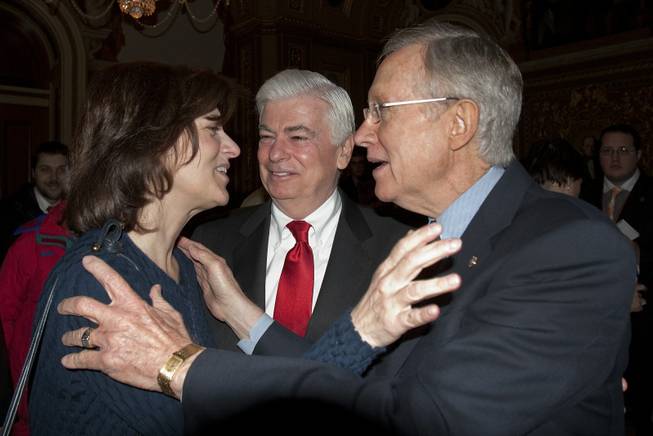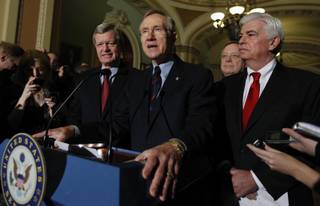
Harry Hamburg / AP
Victoria Kennedy, widow of Sen. Ted Kennedy, hugs Senate Majority Leader Harry Reid of Nevada on Capitol Hill in Washington, Thursday, Dec. 24, 2009, after the Senate passed the health care reform bill. Sen. Christopher Dodd, D-Conn, looks on at center.
Thursday, Dec. 24, 2009 | 8:46 a.m.
Sun Coverage
- How Reid handled health care (12-24-09)
- Senate clears a final procedural hurdle to health care reform (12-23-09)
- Health coverage requirement raises constitutionality debate (12-23-09)
- Reid bobs and weaves to land health care deal (12-22-09)
- GOP to keep up its fight until the final deadline (12-22-09)
- Deal-making gets job done, Reid says (12-22-09)
- Obama welcomes ‘historic’ health care advance (12-21-09)
- Jim Gibbons attacks Harry Reid on health care bill (12-21-09)
- Health care bill clears tough Senate test (12-20-2009)
- Health care compromise gives sweet Medicaid deal to Nebraska (12-20-2009)
WASHINGTON — In a Christmas Eve vote for the history books, the Senate early Thursday passed health care reform legislation along strictly party lines, putting President Barack Obama’s top domestic priority on a path toward passage in the New Year.
Senators filed into the Capitol before dawn after 25 consecutive days of debate that ended on the same bitterly divided tone that dominated the discussion as the final votes neared.
Republicans stood unified against the legislation, and Sen. Mitch McConnell of Kentucky, the Republican leader, vowed to continue blocking the bill he believes does not have popular support.
“This fight isn’t over,” McConnell said.
In a speech before the final vote, he derided the result that was about to unfold.
“We’re left with party line votes in the middle of the night, a couple of sweetheart deals to get it over the finish line and a public that’s outraged,” McConnell said.
Senate Majority Leader Harry Reid returned to the story of Caleb, a high school student in Sparks who has outgrown his prosthetic legs and has been denied new ones by his insurance company.
“How much longer can we afford to put this off?” Reid asked.
“We may not completely cure this crisis today or tomorrow, but we must start toward that end,” Reid said. “Our charge is to move forward.”
Only a majority was needed to pass the final bill, but the tally was 60-39, similar to other votes on the legislation this week as it crossed several procedural hurdles to advance.
Obama called Reid afterward to tell the majority leader he was proud of him, said an aide familiar with the conversation.
The bill now must be merged with the House-passed version, a potentially difficult process as the two chambers take starkly different approaches to key provisions.
Both bills would require that all Americans carry health insurance by 2014, and would fine those who decline coverage. Subsidies would be offered to low- and middle-income families to afford it.
The bills would ban insurance companies from denying coverage for pre-existing conditions and require that most of their income is put toward care, rather than profits.
The Senate version would cost $871 billion over the next decade, primarily to pay for subsidies for the 30 million uninsured.
Money would be raised by taxing the insurance industry, drug makers, tanning salons, high-end insurance plans and high wage earners — those making more than $200,000 a year or $250,000 for couples.
Speaking at the White House, Obama praised the vote which, along with the House-passed bill, “brings us toward the end of a nearly century-long struggle to reform America’s health care system.”
Vice President Joseph Biden presided over the 7 a.m. session, which was not without its drama on the Senate floor.
Democratic Sen. Robert Byrd of West Virginia, 92, broke protocol during the vote to deliver a message.
“This is for my friend, Ted Kennedy,” the senator said, his right finger raised in the air as he cast his vote. “Aye!”
In the gallery was Victoria Reggie Kennedy, the widow of the former senator who died earlier this year after a life’s career spent working on health care reform.
The visitors’ galleries were filled with onlookers, including White House officials and 83-year-old Democratic Rep. John Dingell of Michigan, whose father introduced the first health care reform bill.
As each Democratic “aye,” emerged, one visitor in the gallery quietly heard the person next to him saying, “Yes!” with each vote.
When it came time for Reid to cast his vote, the majority leader who has struggled for months to assemble the votes needed for passage first mistakenly said, “No” before quickly changing his vote to an “aye.”
The chamber gasped then erupted in laughter.
Reid joked about it afterward with reporters, saying he was trying to create a sense of bipartisanship. But later Reid told the Sun he was just caught up in his thoughts.
“I was just sitting there thinking about everything,” Reid said. “Just thinking about what we’d been through.”
Every Republican voted no, except Sen. Jim Bunning of Kentucky who was absent after missing several of the week’s votes on health care.
Republican Sen. John Ensign of Nevada voted against the bill he has asserted would lead to higher insurance costs and an undue intrusion of government into the health care industry.
Ensign lost a vote earlier this week to declare the bill unconstitutional, a battle that will likely continue in court by opponents of the legislation.
Polls on health care reform are mixed.
Democrats believe voters will become more supportive once they learn about the bill’s provisions. Republicans believe voter opinion will continue to deteriorate.
Reid was celebrated by his colleagues for the difficult job leading to the morning’s vote.
Seven administrations have tried and failed to pass health care reform. The White House’s health policy director, Nancy-Ann DeParle, relayed a story from a colleague after watching the vote from the visitors’ gallery.
“Health care in our country is going to be defined by three Harry’s: Harry Truman, Harry and Louise, and the big guy, the majority leader,” DeParle told the Sun. She was referring to the Democratic president who led health care reform and the characters in the industry TV ads that doomed President Bill Clinton’s health reform effort.
“He drove this and he got it done. I don’t think anyone else could have done this,” DeParle said.
Sen. Richard Durbin, the Democratic Whip, said the corridors of the Senate are filled with portraits and statues of political leaders.
“But I will tell you, the contribution to this nation made by the senator from Searchlight, Nevada will become one of the shining chapters in the history of the United States Senate and our nation,” Durbin said. “He achieved what others have failed trying to achieve. And he did it with the tenacity and the strength and the determination that I’ve never seen in my time.”


Join the Discussion:
Check this out for a full explanation of our conversion to the LiveFyre commenting system and instructions on how to sign up for an account.
Full comments policy